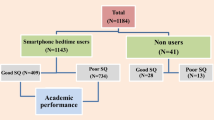Abstract
The insufficiency of sleep has become a widespread problem. The global development and rise of megacities have resulted in a drastic change in the life style of modern man. Increase in the daily commuting distance of a worker is a consequence of such development that has become a potential cause of reduced duration of sleep in the population. The problem of sleep deprivation persists across individuals of all age groups. An adolescent whose sleep requirement is higher than the adults and pre-adolescent children is also not an exception. The phase of adolescence is associated with the delayed bedtime and earlier wake time due to the early morning schools. In this regard, it is important to know the factors that contribute towards sleep reduction in adolescents. Long travelling distance from home to school is one such factor. This study signifies the combinatorial effect of daily commuting distance and school timing on the sleep duration of an adolescent studying in morning and dayshift schools. Findings of the present investigations revealed that commuting distance and school timings have profound effect on sleep of adolescent school students. The average sleepiness score of morning shift students is more than normal sleepiness level suggesting a chronic sleep deprivation among this group and rendering them to higher risk of excessive daytime sleepiness.




Similar content being viewed by others
References
Samuels C. Sleep, recovery, and performance: the new frontier in high-performance athletics. Phys Med Rehabil Clin N Am. 2009;20(1):149–59.
Paksarian D, Rudolph KE, He JP, Merikangas KR. School start time and adolescent sleep patterns: results from the US national comorbidity survey—adolescent supplement. Am J Public Health. 2015;105(7):1351–7.
Nag C, Pradhan RK. Sleep deprivation and level of C-reactive protein. Biol Rhythm Res. 2011;42(3):209–18.
Carskadon MA, Harvey K, Duke P, Anders TF, Litt IF, Dement WC. Pubertal changes in daytime sleepiness. Sleep. 1980;2:453–60.
Hansen M. The impact of school daily schedule on adolescent sleep. Pediatrics. 2005;115(6):1555–61.
Lufi D, Tzischinsky O, Hadar S. Delaying school timing by one hour: some effects on attention levels in adolescents. J Clin Sleep Med. 2011;7(2):137–43.
Owens JA, Belon K, Moss P. Impact of delaying school start time on adolescent sleep, mood, and behavior. Arch Pediat Adol Med. 2010;164(7):608–14.
Hoehner CM, Barlow CE, Allen P, Schootman M. Commuting distance, cardiorespiratory fitness, and metabolic risk. Am J Prev Med. 2012;42(6):571–8.
Emre O, Elci M. To go or not to go†¯: the relationship between commuting and withdrawal behavior. J Bus Stud Q. 2015;5(2):39–51.
Hansson E, Mattisson K, Björk J, Östergren PO, Jakobsson K. Relationship between commuting and health outcomes in a cross-sectional population survey in southern Sweden. BMC Public Health. 2011;11(1):834.
Kagemaya T, Nishikido N, Kobayashi T, Kurokawa Y, Kaneko T, Kabuto M. Long commuting time, extensive overtime and sympathodominant state assessed in terms of short term heart rate variability among male white collar workers in the Tokyo megalopolis. Ind Health. 1998;36:209–17.
Pereira EF, Moreno C, Louzada FM. Increased commuting to school time reduces sleep duration in adolescents. Chronobiol Int. 2014;31(1):87–94.
Johns MW. A new method for measuring daytime sleepiness: the Epworth Sleepiness Scale. Sleep. 1991;14:540–5.
Stress questionnaire for students. Ministry of Social Security, National Solidarity and Reform Institutions. http://www.gov.mu/portal/sites/suicideprevention/file/student. Accessed 8 Jan 2013.
Wahistrom K. Changing times: findings from the first longitudinal study of later high school start times. NASSP Bull. 2002;86(633):3–21.
Owens J, Drobnich D, Baylor A, Lewin D. School start time change: an in-depth examination of school districts in the US. Mind Brain Educ. 2014;8(4):182–213.
O’Malleya EB, O’Malleya MB. School start time and its impact on learning and behavior. Sleep Psychiatr Disord Child And Adolesc. 2008;79.
Lamberg L. High schools find later start time helps students’ health and performance. JAMA. 2009;301(21):2200–1.
Singh R, Sharma R, Suri JC, Kapoor R, Das S. Effect of early school timings on mood and performance of students. Indian J Sleep Med. 2010;5(3):88–94.
Dotto L. Sleep stages, memory and learning. CMAJ. 1996;154(8):1193–6.
Edwards F. Early to rise? The effect of daily start times on academic performance. Econ Educ Rev. 2012;31(6):970–83.
Lufi D, Tzischinsky O, Hadar S. Delaying school starting time by one hour: some effects on attention levels in adolescents. J Clin Sleep Med. 2011;7(2):137–43.
Durmer JS, Dinges DF. Neurocognitive consequences of sleep deprivation. Semin Neurol. 2005;25(1):117–29.
National Sleep Foundation. Teens and sleep. http://sleepfoundation.org/sleep-topics/teens-and-sleep. Accessed 2 Feb 2016.
Seicean A, Redline S, Seicean S, Kirchner LH, Gao Y, Sekine M, Zhu X, Storfer-Isser A. Association between short sleeping hours and overweight in adolescents: results from a US Suburban High School survey. Sleep Breath. 2007;11(4):285–93.
Kong AP, Wing YK, Choi KC, Li AM, Ko GTC, Ma RC, Tong PC, Ho CS, Ng MH, Lau J, Chan JC. Associations of sleep duration with obesity and serum lipid profile in children and adolescents. Sleep Med. 2011;12(7):659–65.
Lowry R, Eaton DK, Foti K, McKnight-Eily L, Perry G, Galuska DA. Association of sleep duration with obesity among US high school students. J Obes. 2012;476914.
Vgontzas AN, Bixler O, Lin H, Prolo P, Mastorakos G, Vela-bueno A, Kales A, Chrousos GP. Chronic insomnia is associated with nyctohemeral activation of the hypothalamic-pituitary-adrenal axis†¯: clinical implications. J Clin Endocrinol Metab. 2001;86(8):3787–94.
Author information
Authors and Affiliations
Corresponding author
Ethics declarations
Funding
This study was funded by Chhattisgarh Council of Science and Technology (CGCOST), Raipur (Grant No. 8043/CCOST/MRP/13, Raipur dated 27/12/2013).
Conflict of interest
On behalf of all authors, the corresponding author states that there is no conflict of interest.
Ethical approval
All procedures performed in studies involving human participants were in accordance with the ethical standards of the institutional research committee (IEC Ref No. 017/IEC/PRSU/2013 dated April 15, 2013) and with the 1964 Helsinki declaration and its later amendments or comparable ethical standards.
Informed consent
Informed consent was obtained from all individual participants included in the study.
Rights and permissions
About this article
Cite this article
Pradhan, R.K., Sinha, N. Impact of commuting distance and school timing on sleep of school students. Sleep Biol. Rhythms 15, 153–158 (2017). https://doi.org/10.1007/s41105-017-0091-0
Received:
Accepted:
Published:
Issue Date:
DOI: https://doi.org/10.1007/s41105-017-0091-0




